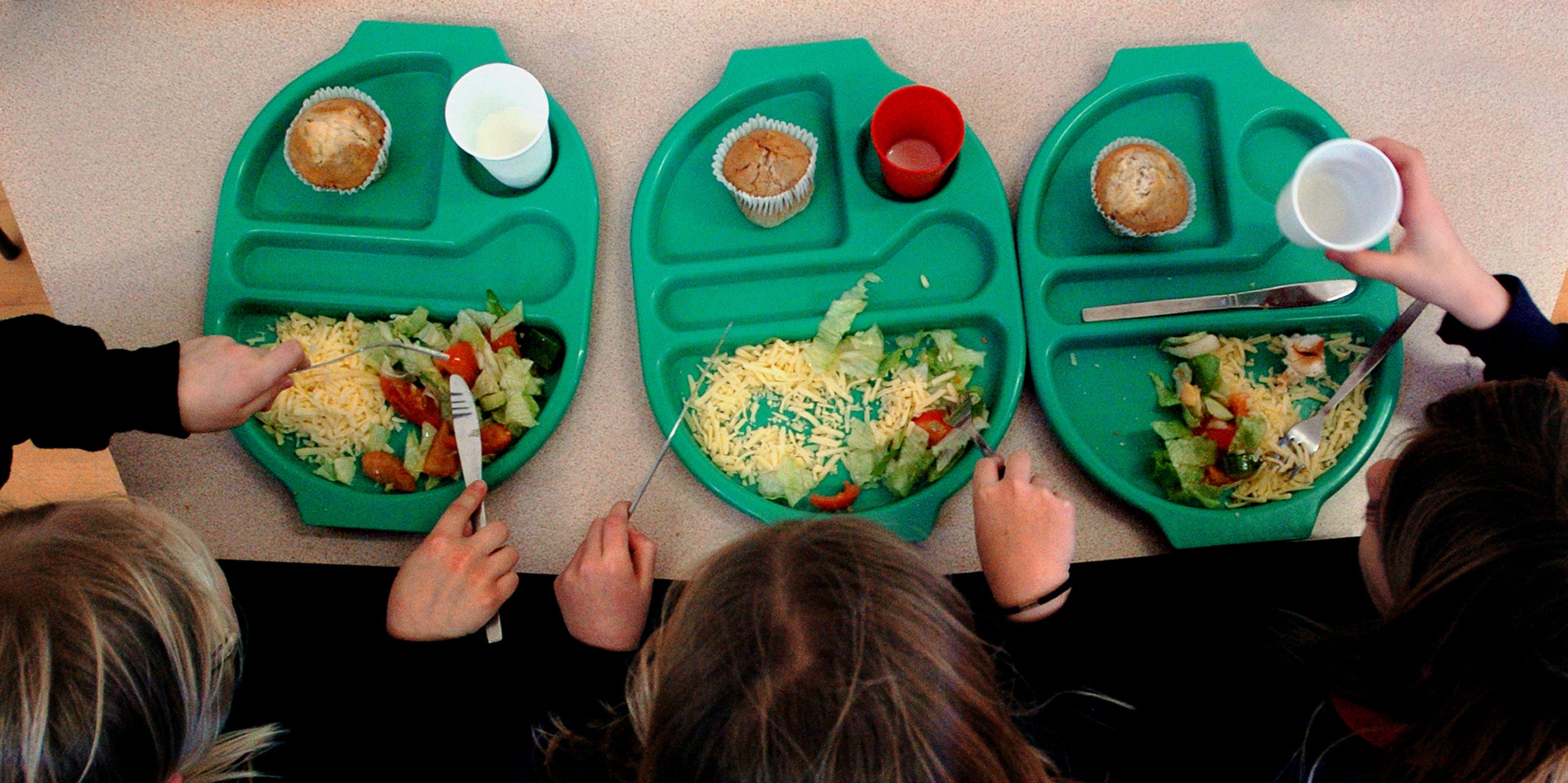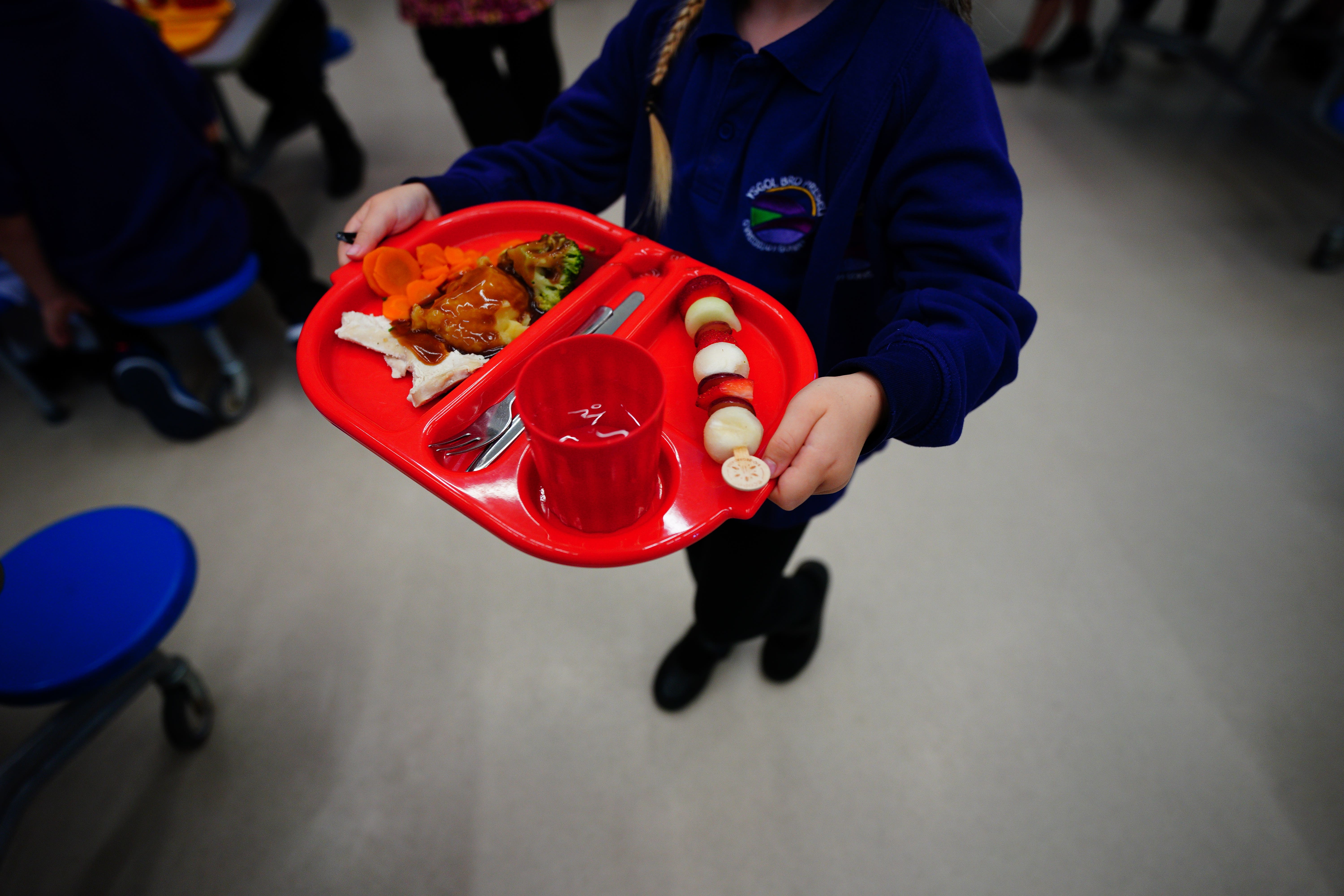School meals industry ‘on its knees’ faced with shortages and rising costs
Some providers using more processed food and ditching British meat as prices soar, poll finds
Children are facing a deterioration in school meals due to shortages and soaring prices in the cost of living crisis, a survey suggests.
School meal providers have said they are being forced to cut back on the quality of meals and are using more processed food and poorer-quality meat for student lunches because of cost pressures.
The school food industry has now warned it is “on its knees” because of a mismatch between funding and rising food costs – and said that the situation was only likely to get worse in the coming months.
Speaking to The Independent, one headteacher said that colleagues were even considering the idea of serving just cold food in order to cut down on costs.
In a new poll by Laca, the industry body representing school caterers, 91 per cent of 99 school meal providers surveyed across England and Wales said they are experiencing food shortages, with more than 60 per cent saying this has not improved since May.
The survey, the respondents of which provide food to nearly 10,000 schools, found that prices have risen by 30 per cent since May.
This is in addition to the 20 per cent price increases that Laca members reported in May, compared with April 2020.
Have you been affected by this story? Get in touch with zoe.tidman@independent.co.uk
Some 28 per cent of respondents said they were now using more processed food to cope with rising costs.
Out of those caterers who have experienced increases in the price of meat, 13 per cent had already switched from British meat to products from abroad, while 35 per cent were considering doing so.
More than half of school caterers polled thought the quality of school meals would get worse over the coming months.
“School meal providers are having to do more with less,” Kevin Courtney from the National Education Union said. “This is putting the health of our schoolchildren in jeopardy.”
The chair of Laca said that some vulnerable children could be soon forced to go without their only hot meal of the day.
“Despite the best efforts of our members and dedicated frontline staff, the school meals industry is on its knees,” said Brad Pearce.
“The challenges facing our industry are set to get worse over the coming weeks and months.
“Without an increase in school meal funding, the most vulnerable children in our society will go without, possibly, their only hot, healthy and nutritious meal of the day.”

School caterers have to meet mandatory food standards set by the government, but Laca said this was coming at a “great cost” as prices escalate. Its members said they were having to provide fewer choices and put on cheaper meals more often in a bid to stay in line with the requirements.
Mumin Humayun, a secondary school headteacher, told The Independent the situation was “very challenging at present”.
Some colleagues were now considering the idea of serving only cold food to cut back on the cost of using ovens, Mr Humayun added.
Headteacher Pepe Di’Iasio told The Independent his school had been serving less varied meals, and that it was trying to reduce frying in the kitchen to save money, as costs had risen by more than 11 per cent since the start of the term.
He said his school was absorbing the increase in prices to avoid passing it on to parents, but he added: “This isn’t sustainable for much longer.”

Mr Courtney said the government had cut the amount of money spent on school meals by 25 per cent in real terms over the past 12 years. The union boss said it needed to increase this funding in line with inflation “rather than cutting standards to the detriment of children’s health”.
The government funds free school meals for the most disadvantaged pupils. But Geoff Barton, from the Association of School and College Leaders, said this was currently “insufficient to meet inflationary costs”.
“This will inevitably jeopardise the quality of the meals that can be provided to pupils,” he said. “This is an entirely unacceptable situation when it is so obvious that children need the guarantee of a good, nutritious meal every day.”
He argued that the government should pay for free school meals for all primary school children. Laca said it wanted free school meals for all families on universal credit, as some are currently shut out.

This is the case with Tayyaba Siddiqui from London, a part-time NHS worker on universal credit, who recently found out that her son no longer qualifies for free meals as her income is considered to be too high.
The single mother told The Independent she still needs the support. “We are not living, we are surviving,” she said. Her son has been opting for cheaper food options in school, including sandwiches that contain a single cheese slice.
Stephanie Slater, from the charity School Food Matters, said there would be a “twin benefit” from letting more families access free school meals. More families would receive help, and school caterers would benefit from economy of scale.
She said meal numbers were “down” at the moment partly because low-income families cannot afford them.
The School Food Review Working Group - a coalition of 36 groups including charities, catering companies and academics - said the rising cost of food meant it was critical for more people to be entitled to free school meals.
Dr Nick Capstick, chair of the group, said: “The real pressure at the moment is on the families on low incomes who are struggling to buy food.
“We know there are 800,000 children living in poverty who still don’t qualify for a free school meal. Raising the threshold would provide immediate support to these children with the bonus of providing educational and wellbeing benefits while providing economies of scale to help school caterers.”
“The rising price of food is putting pressure on caterers, but the good news is that this survey shows the vast majority of them (94 per cent) are meeting the mandatory school food standards, ensuring children have access to balanced school meals.”
A government spokesperson said: “We have expanded access to free school meals more than any other government in recent decades, which currently reach 1.9 million children.”
They said schools were also being supported with £53.8bn in core funding this year and a £4bn increase in overall funding from the previous academic year.






Join our commenting forum
Join thought-provoking conversations, follow other Independent readers and see their replies
Comments